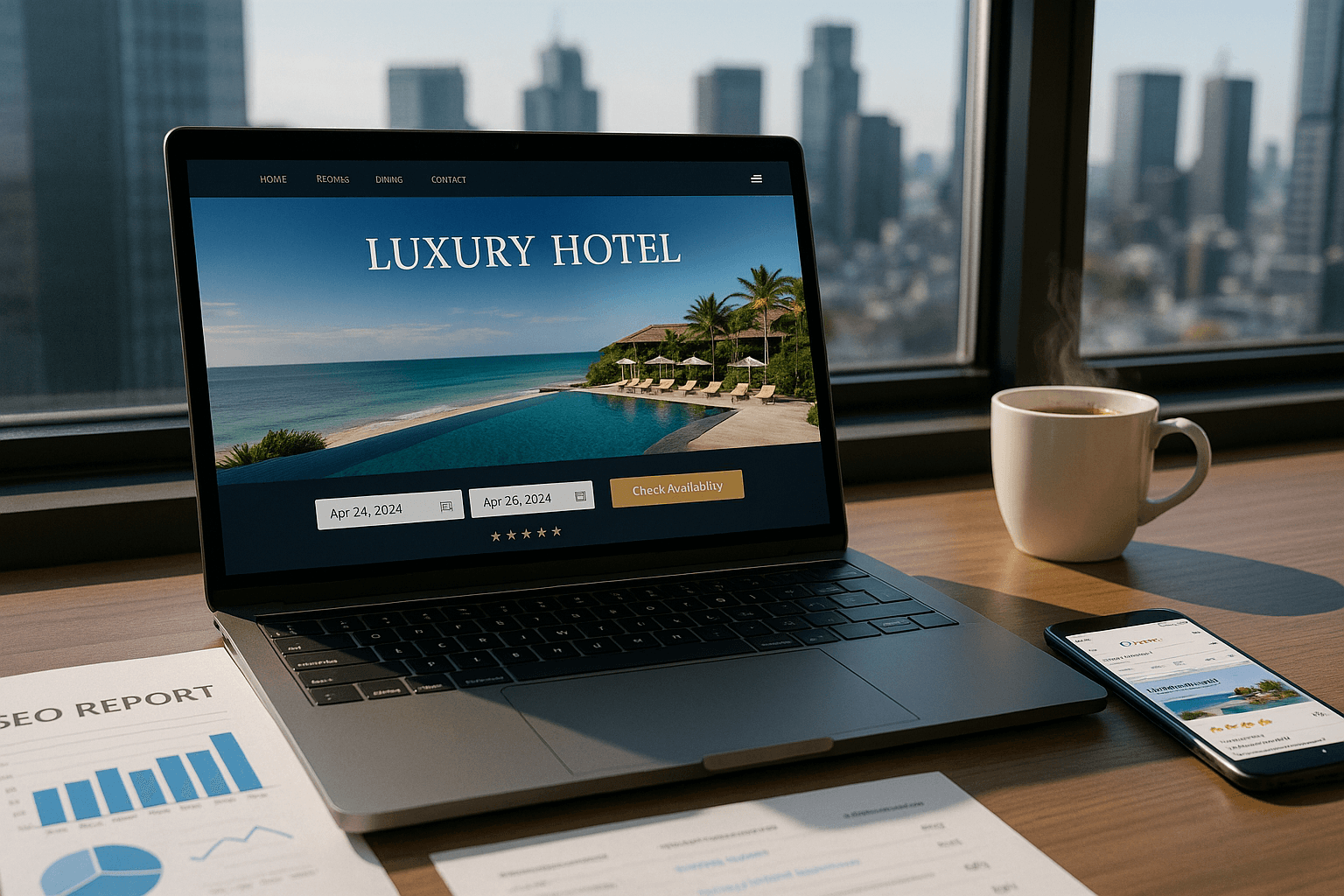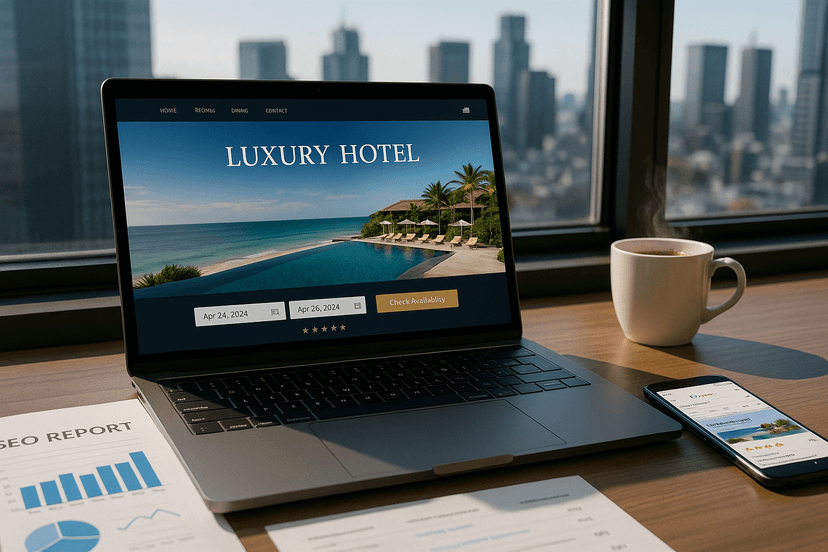Introduction
In today’s digital landscape, having a strong online presence is crucial for hotels of all sizes. With the majority of travelers turning to search engines to plan their trips, implementing effective SEO for hotels has become essential rather than optional. A well-executed SEO strategy can dramatically increase your hotel’s visibility, drive more direct bookings, and reduce dependence on costly OTA (Online Travel Agency) commissions.
This comprehensive guide explores how hotels can leverage SEO to stand out in a competitive market, attract more potential guests, and ultimately increase revenue. Whether you’re managing a boutique inn or overseeing the digital marketing for a major hotel chain, these strategies will help elevate your online visibility and connect with travelers at crucial decision-making moments.
Why SEO Matters for Hotels
The hospitality industry is increasingly digital, with most travelers researching and booking accommodations online. Consider these compelling reasons why SEO should be a priority for your hotel:
Direct bookings are more profitable than those made through third-party platforms, which typically charge commissions of 15-30%. A strong SEO strategy drives traffic directly to your website, potentially saving thousands in commission fees.
The traveler’s journey often begins with a search query. By ranking well for relevant search terms, your hotel can influence potential guests early in their decision-making process.
Unlike paid advertising, which stops generating traffic once you stop paying, SEO creates sustainable, long-term results that continue to deliver value over time.
A well-optimized website provides a better user experience for potential guests, making them more likely to book directly with you.
Essential On-Page SEO Strategies for Hotels
On-page SEO focuses on optimizing individual pages of your hotel website to rank higher in search results. Here are key strategies specifically tailored for hotel websites:
Keyword Research and Implementation
Start with thorough keyword research focusing on terms potential guests might use when planning their stay. These typically include:
Location-based terms (e.g., “hotels in Miami Beach”)
Amenity-focused keywords (e.g., “hotel with rooftop pool Chicago”)
Experience-related searches (e.g., “family-friendly resorts in Orlando”)
Event accommodation searches (e.g., “hotels near Boston Marathon”)
Implement these keywords naturally throughout your content, including page titles, headings, meta descriptions, and body text. Avoid keyword stuffing, which can harm your rankings.
Compelling Meta Titles and Descriptions
Create unique, descriptive meta titles and descriptions for each page of your hotel website. These elements not only influence rankings but also serve as your “advertisement” in search results. Include your primary keyword and compelling reasons to choose your property, such as:
“Luxury Beachfront Hotel in Miami | Private Balconies & Ocean Views”
Optimized Room and Amenity Pages
Create dedicated pages for each room type and major amenity, optimizing each for specific search terms. For room pages, include:
Detailed descriptions highlighting unique features
High-quality images (with optimized alt text)
Clear pricing information
Availability calendars
Direct booking options
For amenity pages (spa, restaurant, pool, etc.), focus on the unique experiences guests can enjoy at your property.
Local SEO: Capturing Nearby Travelers
Local SEO is particularly important for hotels, as many bookings come from travelers searching for accommodations in specific locations. Here’s how to optimize your hotel’s local presence:
Google Business Profile Optimization
Your Google Business Profile (formerly Google My Business) is crucial for local search visibility. Ensure your profile is:
Completely filled out with accurate information
Enhanced with high-quality photos of your property
Regularly updated with posts about special offers or events
Categorized correctly as a hotel/lodging business
Local Citation Building
Ensure your hotel’s name, address, and phone number (NAP) are consistent across the web, particularly on:
Travel directories
Local business listings
Chamber of commerce websites
Tourism board sites
Inconsistent information can confuse both search engines and potential guests, potentially harming your rankings.
Mobile Optimization: A Must for Hotel Websites
With over 70% of travel research and booking happening on mobile devices, having a mobile-optimized website is non-negotiable for hotels. Key mobile optimization strategies include:
Implementing responsive design that adjusts seamlessly to all screen sizes
Ensuring fast loading times on mobile networks
Making booking forms easy to complete on smaller screens
Creating tap-friendly navigation
Enabling click-to-call functionality for immediate reservations
Google now uses mobile-first indexing, meaning it primarily uses the mobile version of your website for ranking and indexing. A poor mobile experience can significantly impact your search visibility.
Content Marketing for Hotel SEO
Content marketing is a powerful SEO tool for hotels, allowing you to target various stages of the traveler’s journey while building authority in your destination. Effective content strategies include:
Destination Guides
Create comprehensive guides about your location that answer questions travelers might have:
“Top 10 Family Activities in San Diego”
“A Foodie’s Guide to New Orleans”
“Hidden Gems in Downtown Portland”
These guides establish your hotel as a local authority while targeting valuable search terms.
Seasonal and Event Content
Develop content around seasonal attractions and local events that drive travel to your area:
“Where to Stay for New York Fashion Week”
“Best Hotels for Viewing Cherry Blossoms in Washington DC”
“Ski Season Accommodations in Aspen: What to Expect”
This content can capture travelers planning trips around specific events or seasons.
Visual Content
Invest in high-quality visual content that showcases your property and destination:
Virtual tours of your hotel
Drone footage of your property and surroundings
Instagram-worthy photo guides to local attractions
Visual content improves engagement metrics and provides opportunities for image SEO.
Technical SEO Considerations for Hotel Websites
Technical SEO ensures search engines can efficiently crawl, index, and render your website. For hotel websites, key technical considerations include:
Site Speed Optimization
A fast-loading website is crucial for both user experience and SEO. Hotel websites often suffer from slow loading times due to large image files and complex booking systems. Improve speed by:
Compressing images without sacrificing quality
Implementing browser caching
Minifying CSS and JavaScript
Using a content delivery network (CDN)
Structured Data Markup
Implement schema markup specifically for hotels to help search engines understand your content and potentially display rich results:
HotelRoom schema for room types and availability
Offer schema for special rates and packages
Review schema to display star ratings in search results
FAQPage schema for common guest questions
Proper schema implementation can significantly enhance your search listings and improve click-through rates.
Leveraging Reviews for Better Rankings
Online reviews influence both potential guests and search engine rankings. Develop a strategy to generate and manage reviews:
Encourage satisfied guests to leave reviews on Google, TripAdvisor, and other platforms
Respond thoughtfully to all reviews, both positive and negative
Incorporate user-generated content into your website
Monitor review sites for inaccurate information
Positive reviews improve click-through rates from search results and send strong trust signals to search engines.
Monitoring and Analyzing Your Hotel’s SEO Performance
Continuous monitoring and analysis are essential for refining your hotel’s SEO strategy. Key metrics to track include:
Organic search traffic to booking pages
Keyword rankings for primary terms
Conversion rates from organic search
Local pack appearances
Click-through rates from search results
Use these insights to identify opportunities for improvement and measure the ROI of your SEO efforts.
Conclusion
Effective SEO for hotels requires a multifaceted approach that addresses technical website elements, content quality, local search visibility, and user experience. By implementing the strategies outlined in this guide, hotels can improve their search engine rankings, attract more direct bookings, and reduce dependence on third-party booking platforms.
Remember that SEO is a long-term investment that builds value over time. While you might not see immediate results, consistent effort will gradually improve your hotel’s online visibility and booking potential. Start by addressing the fundamentals—ensuring your website is technically sound, optimized for relevant keywords, and providing valuable content for potential guests—then expand your strategy as resources allow.
In an industry where visibility directly impacts occupancy rates, mastering SEO provides hotels with a competitive advantage that translates to tangible business results. Whether you’re managing SEO in-house or working with specialists, making SEO a priority will position your property for sustainable online success in an increasingly digital marketplace.




